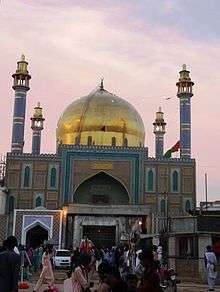Jhulelal (Sufism)

Part of a series on Islam Sufism |
|---|
|
|
List of sufis |
|
|
Jhulelal (Sindhi/Urdu: جھولےلال), refers to Lal Shahbaz Qalandar, a prominent Sunni Muslim saint of the Suhrawardy Sufi order who lived in the Middle East, Sindh (Pakistan) and India in the tenth century.[1]
The term has been popularized by the song Dama Dam Mast Qalandar, in which Lal Shabaz Qalandar has been referred to as "Jhulelal Qalandar".[2] The term Jhulelal means "red bridegroom".[2]
According to the Garland Encyclopedia, Lal Shabaz Qalandar was referred to as Jhulelal (red bridegroom) because he was promised marriage to a daughter of his friend, but the friend died and later his friend's son refused to allow the agreed upon marriage, which caused Lal Shabaz Qalandar grief. Lal Shabaz Qalandar, although from Marwand, whose family came from Baghdad, had traveled to Sindh and helped many people and attracted a lot of people to Islam and was revered by the local Sindhi population. Lal Shabaz Qalandar had also been reputed for performing many miracles and was seen as a very holy figure in Sindh.[3]
References
- ↑ Kugle, Scott (5 March 2007). Sufis and Saints' Bodies: Mysticism, Corporeality, and Sacred Power in Islam. The University of North Carolina Press. ISBN 0807857890.
- 1 2 The Garland Encyclopedia of World Music: South Asia : the Indian subcontinent, Garland Publishing, p. 760
- ↑ Sells, Michael (1 January 1995). Early Islamic Mysticism: Sufi, Qur'an, Mi'raj, Poetic and Theological Writings (1 ed.). Paulist Press. ISBN 0809136198.